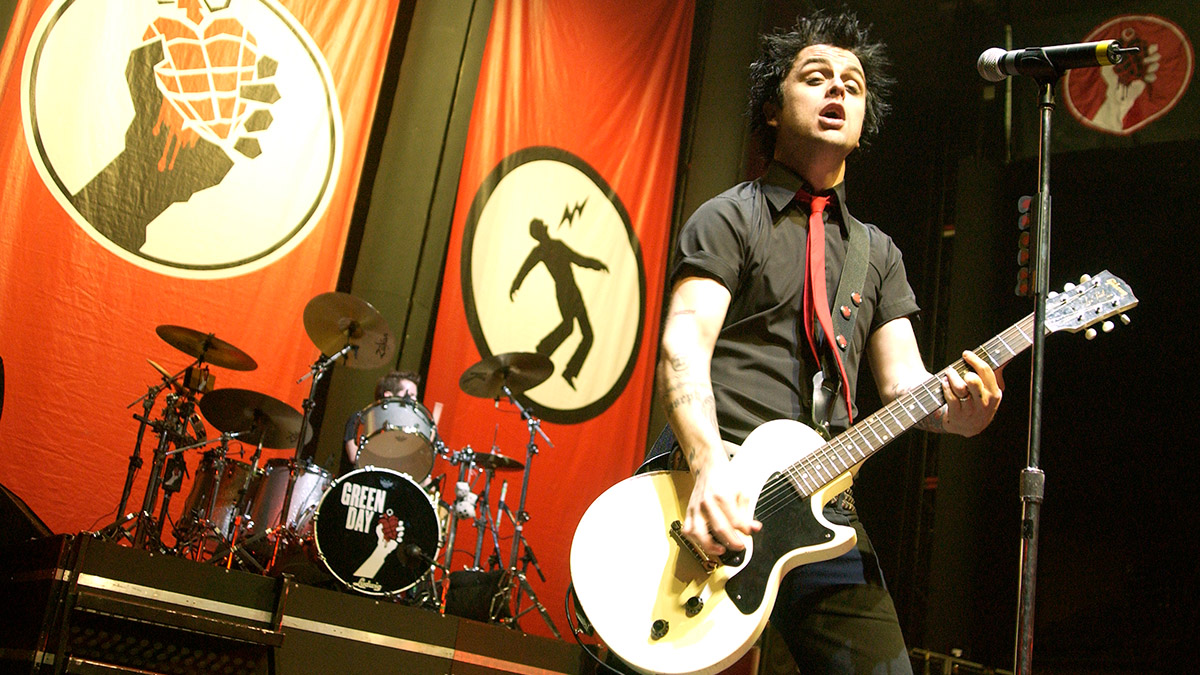
Green Day began the 1990s as a trio of snot-nosed Bay Area-punks, but they ended it as one of the biggest rock bands in the world, with three consecutive multi-platinum albums (led by the mega-smash 1994 effort Dookie), a string of hit singles (including the prom-dance staple Good Riddance [Time of Your Life]) and numerous sold-out tours.
But at the dawn of the new millennium the band was at a crossroads. Their 2000 effort, Warning, which saw them move in a more pop- and folk-influenced direction, was, at least for Green Day, a commercial disappointment – in part due to an unenthusiastic response from fans, and also the fact that its songs leaked onto Napster weeks before its release.
Furthermore, personal relationships between Billie Joe Armstrong, bassist Mike Dirnt and drummer Tré Cool were at a low, with Dirnt admitting to Rolling Stone at the time that “breaking up was an option.”
Nevertheless, Green Day soldiered on, and by 2002 were 20 songs into a follow-up album, titled Cigarettes and Valentines. And then the demo master tapes were stolen.
“We didn’t know what we really wanted to do,” Armstrong tells Guitar World. “We’d been around for, like, a decade and a half, and we were just indecisive.” A lesser band might have elected for the breaking-up option.
But rather than calling it a day at the ripe old age of 30, Armstrong and his band mates chose a different path, helped in no small part by some good advice from Green Day’s longtime producer, Rob Cavallo.
“He said something to me that was really inspiring,” Armstrong says. “He was like, ‘Let’s make something that’s just monumental. Do things that you haven’t done before. Just fucking go for it and make an epic statement.’ ”

That “something” became American Idiot, not only the most epic statement of Green Day’s career, but also the most epic statement of any rock band in 2004 – let alone a supposed three-chord punk-rock outfit.
A quasi-rock-opera celebrating and lamenting the disillusioned and disenfranchised in a post-9/11 America in the throes of the Iraq war, George W. Bush’s divisive presidency and all manner of cultural and social dysfunction, the record incorporated big ideas into even bigger musical statements.
Armstrong and his bandmates took inspiration from rock operas and concept albums like the Who’s Quadrophenia and Tommy, David Bowie’s The Rise and Fall of Ziggy Stardust and the Spiders from Mars and Pink Floyd’s The Wall, but also musicals like Jesus Christ Superstar, The Rocky Horror Picture Show and Grease.
They blasted out punk anthems like Holiday and the title track, but also extended multi-movement epics like Jesus of Suburbia and Homecoming, the latter “a sort of A Quick One, While He’s Away-type of suite,” Armstrong says.
Regarding how it all came together, Armstrong says, “We had access to a recording studio 24 hours a day, and we were just fucking around, doing it for fun. And I remember the response from Rob was, ‘This is it.’ And then we were like, ‘Oh, fuck, it is!’ I was getting to make the music I’d always wanted to make and the record I’d always dreamed of.”
In essence, that meant pushing everything to the hilt – including his guitar approach. “I wanted to play more guitar solos and let that part of me come out,” Armstrong says. “And I was messing with different pedals and working to get the best sounds and to do it with confidence.”
Those sounds came courtesy of two primary six-strings – Armstrong’s trusty Gibson Les Paul Junior, and a Les Paul Standard he refers to as “Boobie” – and also two modified amps: a Marshall known as the “Idiot Amp,” which was modded with an extra gain stage for a crunchy, excessively thick sound, and a 50-watt Park 75 with a version of Armstrong’s “Dookie” mod in it.
A tweed Fender Tremolux was also employed for clean tones, as well as “smaller” tones like those heard on the intro to American Idiot.
When Green Day emerged from the studio, it was as a band transformed. Whether anyone would appreciate that transformation, however, remained to be seen.
“We were known for writing two-minute punk songs, and here we were doing these eight-minute opuses,” Armstrong says. “There was a part of us that was like, ‘God, what are people gonna think of this?’ Then it just got to a point where we said, ‘Fuck ’em. This is where we wanna be,’ you know? ‘Give us an A or give us an F – there’s no in-betweens.’ ”
The band got their first taste of how things could go down before the album came out, when they were doing pre-production at the Grand Olympic Auditorium in downtown Los Angeles and decided to invite a crowd to come and watch.
I remember there was almost shock in the crowd, where people were like, ‘What the f**k did I just hear?’
“We talked to KROQ and put out the word, filled the place up and did a little concert,” Armstrong says. “That was the first time that we played Jesus of Suburbia. And I remember there was almost shock in the crowd, where people were like, ‘What the fuck did I just hear?’ I don’t know if that was a good thing or a bad thing, but it felt like a moment where we could say, ‘Okay, we’re on the right track. This feels good…’ ”
Things, of course, proved to be really good. Released September 24, 2004, American Idiot not only revived Green Day’s career, but went on to become their first Number 1 album and one of the biggest rock records of the decade.
It spawned five hit singles – the title track, Boulevard of Broken Dreams, Wake Me Up When September Ends, Holiday and an edited-down Jesus of Suburbia – and was nominated for seven Grammy awards, winning for Best Rock Album (American Idiot) and Record of the Year (Boulevard of Broken Dreams).
In 2009, a stage adaptation of the story premiered in Berkeley and eventually made its way to Broadway. To date, American Idiot has sold an astonishing 16 million units worldwide – a number that, for most bands, would easily rank it as a personal best-seller, but when you’re Green Day, and one of your albums is Dookie, makes it number two on the list.
As for how the experience of American Idiot compared to that of its mega-selling older sibling?
“With Dookie, we were so young, and the success part threw me for such a loop that I didn’t know how to respond to it,” Armstrong says.
“Life had changed so quickly that I was always feeling like, ‘Did I enjoy that moment enough?’ So I think that with Idiot, it was, ‘Let’s get the most we can out of this moment as far as feeling gratitude and feeling like we did something special.’
“Because we always wanted to have what our heroes had, like the Who making Tommy or something along those lines. Every band wants to have a Sgt. Pepper’s type of moment. And Idiot was that moment for us.”
It’s a moment that Green Day will revisit on this summer’s stadium tour in support of the new Saviors, which will also see them celebrate the 30th anniversary of Dookie and 20 years of American Idiot.
Regarding what the band has in store for the shows, Armstrong says, “Well, we play a lot of songs off Idiot anyway, but we’re gonna add some more. So in addition to the bigger ones you’ll hear songs like Letterbomb and a few others. We’ve just got to get in and rehearse everything to kind of see what makes sense.”
He continues, “But we definitely plan to celebrate those anniversaries for sure, and play more off Dookie and American Idiot.” Armstrong laughs. “And then at the same time, of course, do plenty of stuff from Saviors and, you know, the other records.”
- Saviors is out now via Reprise.







